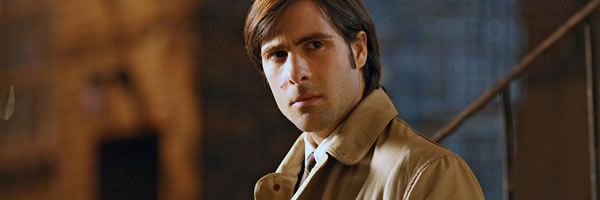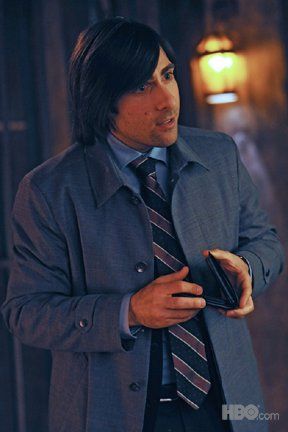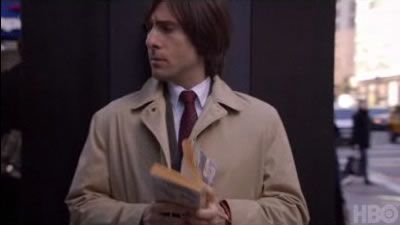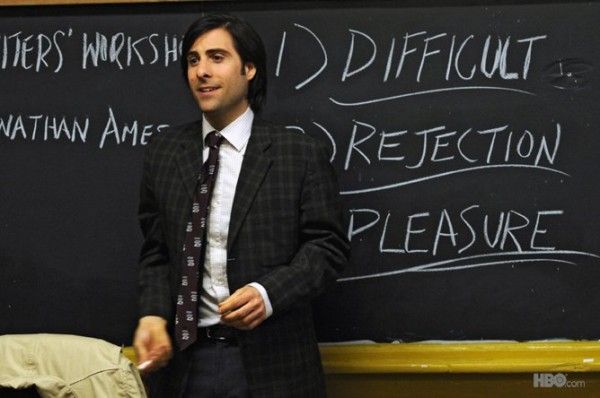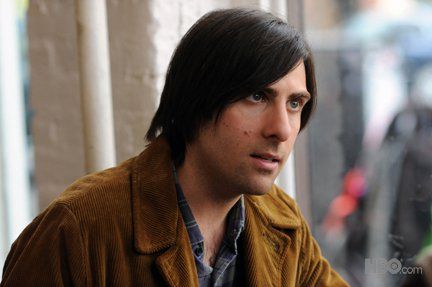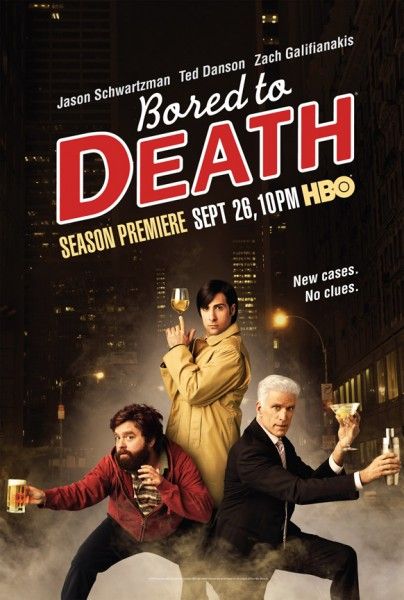Bored to Death is an HBO comedy show with a great pedigree, and a real sneaky sense of humor. Jason Schwartzman stars as Jonathan Ames (also the name of the show’s writer/creator/producer), a novelist who decides to become an unlicensed private detective after getting dumped. He’s flanked by George Christopher (Ted Danson), his rich publishing friend, and Ray Heuston (Zach Galifianakis), his cartoonist buddy. Both friends smoke weed all the time, and often help Ames solve his crimes. Having found its voice midway through the first season, it’s great to see that Bored to Death’s second season has started at the top of its game. The show airs Sundays at 10 pm on HBO.
I got a chance to speak with Jason Schwartzman about the new season. Schwartzman was launched with a star making performance in Wes Anderson’s Rushmore, and the two have collaborated together repeatedly (with their scripted The Darjeeling Limited about to hit DVD and Blu-ray from the Criterion Collection). We got a chance to talk about being a film actor on a TV show, about the detective genre, and the collaborative process. Jason is enthusiastic, clever, and you can tell he’s thoughtful about his process. My conversation with Jason Schwartzman follows after the jump.
JASON SCHWARTZMAN: And we begin!
And… Scene! So Bored to Death Season 2, I really like the show, did you expect it to go to a second season?
SCHWARTZMAN: I hoped. Most of my acting experience – I was on a short term show on Fox called Cracking Up – the majority of my experience is in movies, and when you finish a movie , it’s over, though it goes on and on… you’ll do press and talk about it and stuff. But your job as an actor is done. I was aware of this ending, but there was this feeling of “come back” after season one wrapped, and I was surprised how long those feelings stayed alive inside me - the Jonathan Ames character. It’s almost like dating someone a couple of times, you hope that you can go on another date, but you make a pact with yourself that if it ends that you’re happy to have the dates you did. That was my feeling after the first season, because we all got along so well. I mean it may be too much pressure to ask that the people you work with become your friends, but when you’re working 18-20 hour days with people you don’t like or are mean, you can put up with it for a while, but it makes the work so much harder. Having had those experiences that didn’t go well, I was hyper-aware and thankful of the cast – Ted (Danson) and Zach (Galifianakis) and Jonathan (Ames) being there as our overseer and friend. As the season was going on – I was meeting Zach for the first time – and becoming friends with Ted. When the first season ended you could feel that we were just getting going.
It’s interesting you say that on two fronts. One, having watched a lot of DVD supplements, I’m shocked to hear not everyone is great to work with.
SCHWARTZMAN: I know.
Every DVD tells who great everyone is to work with.
SCHWARTZMAN: Either they’re lying or they’re just lucky.
Watching all the episodes – and you guys say it in the commentary - it was until episode five or six that you got the three of you (Jason, Ted and Zach) in a car together. And that's the moment where the show clicks.
SCHWARTZMAN: Yeah.
It’s three totally different stoner energies playing off each other, as it were.
Schwartzman: Absolutely! Some people say that they’re favorite moments, and I agree too, I couldn’t wait for those scenes. And I still get excited when I see a script with scenes with the three of us, or Ted and Zach, Me and Zach, whatever, but also because you just get more comfortable with each other. At first when I was acting opposite Ted or Zach there was a voice in my head saying “you’re working opposite Zach, one of the funniest people alive,” or “you’re working with Ted who’s one of the funniest people alive and who’s been doing this forever.” He can spot it if it’s wrong. So you’re trying to be free and work, but you’re also holding yourself back because you’re afraid to be judged by these people. I don’t know if it goes away, but you spend enough time with a person, enough time between takes or over the weekend, and someone makes a dumb joke, and it goes back and forth, and you realize no one is perfect, and everyone is capable of being a person, and when enough of those moments add up, you feel like you can do this. When you feel more and more comfortable in front of them, especially when you’ve failed in front of them, it’s very liberating. I was excited for the second season, because I knew I could go back and get back into working with people I now consider friends but also feel ease around. And then also shocked because I’ve never done anything that’s had a second anything. I’ve worked with some of the same directors before repeatedly, and some crew members, but an entire crew with exact same group of actors playing the same characters? I was shocked when I walked back on set the first day because it was like we never stopped. And this crew has seen me be terrible, we’ve all been there when it’s five in the morning, and we’ve been there since nine in the morning the day before, we’ve all been there together. And there’s a strength or comfortability that made the second season – I mean I always say the work is hard – but right from the get go it felt so fun and exuberant, and we were all having so much fun being together. But the same thing happens, you haven’t been together for a while so the first couple episodes you’re comfortable, but you’re getting back into the swing of things.
You’re feeling it out.
SCHWARTZMAN: And nature takes over, by the middle of the season I’m like “yes!” and then the season’s over. And it’s just like life. It’s like bowling, you’re terrible but then you play a couple games and start to figure it out. On the way home, you’re like “ah, I know how to get a strike!” It’s something I love about the show is that we can keep building. And I think with a movie it’s tricky because in 93 minutes or whatever, you have multiple stories going, and have scenes be interesting, move plot forward and pay off, it’s a lot to ask of such a small amount of time. Having done two seasons, I’m enjoying the freedom you have with doing little half hour shows because you don’t have to go as far as quickly or as unnaturally. You try and do a show that’s tight and funny, of course, but at the same time you can keep nudging forward slowly. And I love the show for the spaces between the spaces, which wouldn’t exist in another show, or another movie. I read reviews, rarely for my own stuff, but when you read them, one thing I always find confusing that a show or movie has all this stuff but doesn’t add up, or it’s too emotional, or it’s not emotional enough, or whatever, and I feel like somewhere in the review I’m told “this one lost, this one isn’t as good” To me it’s not a first place, second place third place type thing, to me it should all be waves, it should all be together. In my mind, there are lots of shows that are formulaic, and that’s fine, but I like our show because it’s not like that, and I don’t think it should be. What’s the point of doing stuff it’s all the same? So I think we made this for two groups of people: people who don’t normally like television and want to see something unusual, and then for people who do like television, but would like to see something more, something else. It’s like a playlist on an iPod, or a mix tape, artists that you’ve found a through-line for, saying things the other didn’t, that build upon each other. And hopefully our show is just another song on people’s playlists, and we can all just be different, and have something the other doesn’t. I hope we get a third season.
How many episodes was this season?
SCHWARTZMAN: Eight.
Eight again?
SCHWARTZMAN: That’s about an adult who switches places with an eight year old.
(laughs) I think one of the great things about HBO, but with FX and AMC, we’re seeing shows that you wouldn’t see before, that aren’t – to pay reference to something you’ve done before – “Yo, Teach”-ish. After The Wire… I mean, how can you say anything like “Well, television it’s a little lesser”
SCHWARTZMAN: Yeah, come on, that show is like the greatest thing in the world.
It’s pretty close.
SCHWARTZMAN: It’s pretty close, yeah.
I love The Wire
SCHWARTZMAN: And I agree with you.
How do you feel about going back and forth between movies and TV?
SCHWARTZMAN: I love it. Now television can do so much that a movie can’t, and a movie can do so much that TV can’t.
The nice thing is that television is more comfortable now appealing to niches. You were just in Scott Pilgrim; I think a lot more people could have enjoyed that. There seems to be more freedom on TV these days to try newer things.
SCHWARTZMAN: Lately, because I’m doing this show, I think “This would be more fun to watch this as a mini-series.” “I would like to see this character for one hour once a week for the next two months.” I feel like so many times you see a movie, you just want more. I’m a collaborative person, and I like working with people, and when I feel excited it’s when I’m working with people I trust, and I ask “Do I hold the fork or not?” and they say “don’t hold it” and I say “you’re right.”I like that. I like being edited. To do that, you have to wait, and people that I love are rare, and hard to find. But I have to take care of my family, and you can’t just wait for that, that’s why this whole industry is hard. I love doing films, but when we’re doing Bored to Death, it doesn’t feel like we’re doing TV, it’s a longer shoot than a movie, and it looks the same when you’re on the set, so I don’t really separate it. I’m just happy I’m collaborating with two actors I love, and Jonathan Ames. I love his take on things. I have no movie right now on the horizon. I was doing the show, then I was promoting Scott Pilgrim, and that would have been a window to find something, but there are some actors – when you look at their IMDb page - they have one movie after the next, and how did they find all this stuff they liked, and how do they do it? I tend to compare myself to people who work constantly, and I feel like “jeez, this is crazy” it’s hard to get a job, it’s crazy, and it’s just my way that takes a little bit longer to find things. And the things you find have to get financing, and sometimes they don’t, and I’m just happy to keep going.
So you’re not looking for a super hero franchise to fall back on, you’re not going for Superman or whatever.
SCHWARTZMAN: I don’t have something in my crosshairs, other than “do I like it” but it’s tricky because you can read something and think it’s funny or interesting, and I’ll audition for it and not get it, and then see it and think “dodged a bullet.” You wait for something you think might be good, but ultimately every time it’s a risk. No one’s sure they’re going to make something great. It’s also insane that people pay before they see something, I feel like you should pay on the way out. “That was worth six bucks.” It’s a very tricky thing to make something good. When you see actors who have made stretches of great movies, you wonder how. My attitude about the work is that I hope it works, and you hope that it has that for someone.
You’re playing a character named Jonathan Ames, what’s the collaboration process like with Jonathan Ames, the creator of the show?
SCHWARTZMAN: It’s pretty ideal. We’ve become really good friends, and he’s always thinking about things he’s going to write, and we talk every day or every other day, so I’m around while things are going in to his brain. But for the show, he’ll write the script and he’ll send me the first draft and ask for any notes. And I generally don’t have any, even for first drafts - they’re very tight - so I try and find visual things to do. We have no problem disagreeing with each other, and he’s on set all the time. The director’s are cool about it, but Jonathan’s scripts are micro-balanced, and lines on paper could come off too much or too little, so I’m glad he’s there with the directors to say “too much.” My character is emulating a detective, and I’ve read all the (Dashiell) Hammett books, and (Raymond) Chandler books, so sometimes I’ll see something like a physical gesture and I’ll highlight it, and think that could be a good thing to copy and paste into our show. But then you do it and feels like you’re making fun of it. It’s the line between my character wanting to be one of these people and being one of these people while not spoofing it. It’s a spectrum we’ll do on the set. We’ll do one take that’s plain, that’s got nothing on it, and then we’ll do one that’s total Bogart. But it’s not a spoof.
It sounds like you’re a big Long Goodbye fan.
SCHWARTZMAN: Love it. That walks that line. That’s the shit, that movie.
It sounds like you want to find the happy medium between The Long Goodbye and The Big Lebowski.
SCHWARTZMAN: Yeah, I mean those are two of the greatest movies of all time, so it’s like a band saying “it’s like the Beatles!” No, it’s like an eight generation version of The Ruttles.
The Long Goodbye has that California stoner sensibility and so does Lebowski, what do you think draws detectives to pot?
SCHWARTZMAN: Well, what I love about Hammett and Chandler is that there’s a mystery being solved but it’s by an unlikely person, and in our case by someone who has just burned one. When we were starting the first season, there was a discussion with Jonathan about how much pot did I smoke, and how much am I drinking, do I play stoned, does that become a whole new texture? And he said no, the character has some from a one-hitter sometimes. Think of it more as a glass of white wine, it’s subtle. We don’t even play up – I mean Zach and Ted are definitely getting stoned, they smoke a shitload of pot, but my guy is more a slow, medicinal Xanax type of thing.
He smokes enough so every knows that he’s smoking.
SCHWARTZMAN: He’s smoking just enough to be not a goody two shoes. This is also what I love about my character, and all the characters. They are not judgmental people. It’s fun to play someone who isn’t scoffing at people’s decisions. In the first episode of the first season, a character offers me crystal meth, and I’m about to take it, and to me that could happen at any time, he could get into trouble. What I love about the Chandler books is that Marlowe is almost a bad guy, he’s doing the right thing, but the bad guys respect him, because they’re very similar. We don’t have any villains as extreme as those books, but the people I’m after are highly strange or eccentric and I feel like Marlowe has a relationship to being bad as I have to people who are strange , they respect me because they know we’re not that different.
I also love that your character is innately curious about people, so he’s constantly asking them questions.
SCHWARTZMAN: Jonathan said - I’m getting this wrong - but he said something like that Ted, Zach and I are vehicles for Jonathan to express various sides of himself, and my side is that I get to ask a lot of questions about romance and writing and meaning and making money, and trying to have a place. And I like that because I feel that way too. I like asking questions, and I like that my character asks a lot of questions, and is trying to figure it out. And that’s a joy to play because he doesn’t have it all figured out. He’s not a complete person, I like how he’s still coming together, and hopefully audience will stick around because I’m going to learn about it too as I go. It’s just as much for me as an audience to find out what’s going to happen to him? Is he going to have to move in with his parents, is he going to have to leave New York because it’s too expensive? Is he going to have to not be a writer? Is Ted going to die, and am I going to die? I think it’s a fun character, and my character is just as confused and unsatisfied as the audience.
And with that, we were called. Obviously, Jason can talk. The show is a wonder, and it airs Sundays at 10 PM on HBO.

